
Dar es Salaam (Dar) is the former capital as well as the most populous city in Tanzania and a regionally important economic centre. Located on the Swahili coast, the city is one of the fastest growing cities in the world.

The United Republic of Tanzania is the second largest economy in the East African Community and the twelfth largest in Africa. The country is largely dependent on agriculture for employment, accounting for about half of the employed workforce. An estimated 34 percent of Tanzanians currently live in poverty. The economy has been transitioning from a command economy to a market economy since 1985. Although total GDP has increased since these reforms began, GDP per capita dropped sharply at first, and only exceeded the pre-transition figure in around 2007.

Zanzibar is a semi-autonomous region of Tanzania. It is composed of the Zanzibar Archipelago in the Indian Ocean, 25–50 kilometres (16–31 mi) off the coast of the mainland, and consists of many small islands and two large ones: Unguja and Pemba Island. The capital is Zanzibar City, located on the island of Unguja. Its historic centre is Stone Town, which is a World Heritage Site.
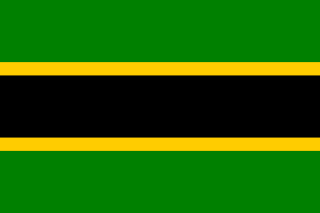
Tanganyika was a sovereign state, comprising the mainland part of present-day Tanzania, that existed from 1961 until 1964. It first gained independence from the United Kingdom on 9 December 1961 as a state headed by Queen Elizabeth II before becoming a republic within the Commonwealth of Nations exactly a year later. After signing the Articles of Union on 22 April 1964 and passing an Act of Union on 25 April, Tanganyika officially joined with the People's Republic of Zanzibar and Pemba to form the United Republic of Tanganyika and Zanzibar on Union Day, 26 April 1964. The new state changed its name to the United Republic of Tanzania within a year.

East Africa or Eastern Africa is the eastern region of the African continent, variably defined by geography. In the United Nations Statistics Division scheme of geographic regions, 20 territories make up Eastern Africa:
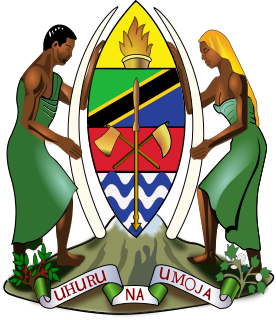
The President of the United Republic of Tanzania is the head of state and head of government of Tanzania. The president leads the executive branch of the Government of Tanzania and is the commander-in-chief of the armed forces.
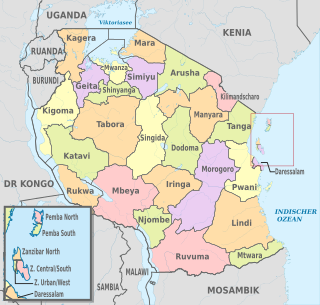
Tanzania is divided into thirty-one regions or mikoa.

The Tanzania national football team represents Tanzania in association football and is controlled by the Tanzania Football Federation, the governing body for football in Tanzania. Tanzania's home ground is Benjamin Mkapa National Stadium in Dar-es-Salaam and their head coach is Mart Nooij from the Netherlands. Tanzania has never qualified for the World Cup finals. Before uniting with Zanzibar, the team played as the Tanganyika national football team.
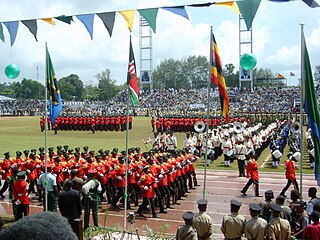
The Tanzania People’s Defence Force (TPDF) is the armed forces of Tanzania. They were set up in September 1964, following a mutiny by the former colonial military force: the Tanganyika Rifles. From its inception, it was ingrained in the troops of the new TPDF that they were a people’s force under civilian control. Unlike some of its neighbors, Tanzania has never suffered a coup d'état or civil war.

The Tanzania Football Federation (TFF), previously Football Association of Tanzania, is the governing body of football in Tanzania. It oversees operations of the Tanznian football league system and the Tanzania national football team. It was founded in 1945 and has been affiliated with FIFA since 1964. Wallace Karia is the new President of the Tanzania Football Federation.
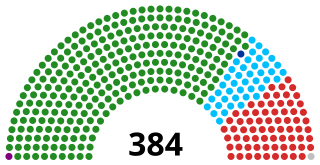
The National Assembly of Tanzania and the President of the United Republic make up the Parliament of Tanzania. The current Speaker of the National Assembly is Job Ndugai, who presides over a unicameral assembly of 393 members.

The Uganda–Tanzania War, known in Tanzania as the Kagera War and in Uganda as the 1979 Liberation War, was fought between Uganda and Tanzania from October 1978 until June 1979, and led to the overthrow of Idi Amin's regime. Idi Amin's forces included thousands of troops sent by Libya.

Ujamaa was the concept that formed the basis of Julius Nyerere's social and economic development policies in Tanzania after it gained independence from Britain in 1961.

The Tanzanian passport is issued to citizens of The United Republic of Tanzania for international travel. The Immigration Department is responsible for the issuance of Passports.
Around seven Tanzanian sign languages were developed independently among deaf students in separate Tanzanian schools for the deaf starting in 1963, though use of several are forbidden by their schools. In 1984, a standardized Tanzanian Sign Language was proposed by the Tanzania Association for the Deaf, using common or similar signs where these exist in the schools which allowed research, but it has not been officially implemented, and there remains little influence between the languages. A dictionary has been produced.
Tanzania is a multilingual country. There are many languages spoken in the country, but no one language is spoken natively by a majority or a large plurality of the population. The Bantu Swahili language and English, the latter of which was inherited from colonial rule, are widely spoken as lingua francas. They serve as working languages in the country, with Swahili being the official national language. There are more speakers of Swahili than of English in Tanzania.

John Joseph Magufuli is a Tanzanian politician and the President of Tanzania, in office since 2015.
Visitors to Tanzania must obtain a visa from one of the Tanzanian diplomatic missions or online unless they come from one of the visa exempt countries or countries whose citizens can obtain a visa on arrival. All visitors must hold a passport valid for 6 months or a month beyond the period of intended stay.
















